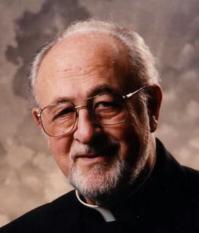By Annysa Johnson
Milwaukee Journal Sentinel
May 11, 2009
http://www.jsonline.com/features/religion/44756432.html
 |
| Weakland |
Retired Archbishop Rembert G. Weakland said Monday that he plans to donate the proceeds from sales of his forthcoming memoir to the Catholic Community Foundation, a local organization that funds programs in southeastern Wisconsin.
The memoir, "A Pilgrim in a Pilgrim Church," is due out in June. In it, the retired archbishop writes openly about his homosexuality and his failure to oversee pedophile priests, according to Publisher's Weekly, which called it "a moving personal confession."
"I was very careful and concerned that the book not become a Jerry Springer, to satisfy people's prurient curiosity or anything of this sort," Weakland told The Associated Press. "At the same time, I tried to be as honest as I can."
Weakland resigned abruptly in 2002 after it was revealed that he had paid $450,000 in archdiocesan funds to a former Marquette University theology student who accused him of date rape in 1979. In 1998, the man, Paul Marcoux, attempted to extort $1?million from Weakland in exchange for a love note the archbishop had written years earlier, according to court records.
A spokesman for the archdiocese said Monday that it is unlikely to seek restitution of the funds paid out by Weakland from the book's profits because they were repaid previously by the retired archbishop and a group of supporters.
Weakland, 82, declined to discuss the book with the Journal Sentinel, which has extensively covered his personal scandal and his alleged role in covering up sex abuse by other priests, now the subject of civil lawsuits.
But he told The Associated Press that he wrote about his sexual orientation because he wanted to be candid about "how this came to life in my own self, how I suppressed it, how it resurrected again."
The archbishop said he considered waiting to publish the book posthumously, but decided against it.
"What I felt was that people who loved me as bishop here, when they read the book will continue to love me. The people who found it difficult, I hope will be helped a little bit by the book," he told the AP.
Weakland is a key witness in a series of civil fraud cases brought against the Milwaukee Archdiocese by victims of alleged clergy sex abuse. In a deposition released in November, he admitted that he transferred priests with a history of sexual misconduct back into churches without alerting parishioners and did not report alleged abuses to police.
He dismissed that testimony while speaking with the AP, saying that "any deposition is just a part of a whole picture and that picture has not been painted yet. And anybody can take out of that any sentence they want.
"I try to deal with this, I hope in an honest way, admitting my weaknesses in not being able to see this earlier, but at the same time doing what I could (to) confront it," the AP quoted him as saying.
Weakland said he wrote in the memoir that he was unprepared for "how lonely it is" to be a bishop and how difficult it can be to get the "feedback and support you need," the AP reported.
Weakland told the AP that Christians needed to speak more openly about gays in the priesthood without the "hysteria" that often characterizes the debate.
Weakland, a Benedictine monk known during his tenure in Milwaukee as an outspoken liberal in the American Catholic Church, plans to move to St. Mary's Abbey in Morristown, N.J., this summer.
Any original material on these pages is copyright © BishopAccountability.org 2004. Reproduce freely with attribution.